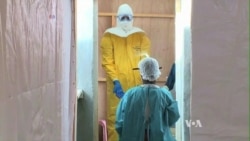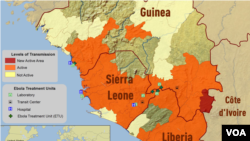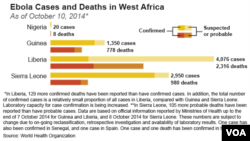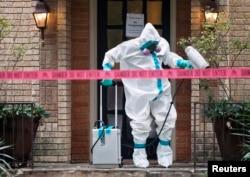Health authorities in the United States are advising the nation’s hospitals to re-evaluate their approach in providing care to Ebola patients.
Speaking Monday in Atlanta, Georgia, U.S. Centers for Disease Control and Prevention Director Tom Frieden urged hospitals to watch for patients with fever or symptoms of Ebola who have traveled from the three worst-affected West African nations - Liberia, Sierra Leone and Guinea - in the past 21 days.
Frieden also said authorities are investigating how a nurse in Dallas became the first person to contract the disease within the United States. He blamed an unknown "breach of protocol" for the infection of the woman, who treated a Liberian man who was the first person to die of Ebola in the United States.
Family members identified the nurse as 26-year-old Nina Pham.
The CDC is monitoring 48 hospital workers who treated or were in contact with that man when he was very sick.
President Barack Obama on Friday met with senior members of his administration for an update on what the White House called the "apparent breach in infection control protocols" at the Dallas hospital. He said that the investigation should occur quickly and that lessons learned from it should be disseminated to health care workers nationwide.
Also Monday, Obama spoke with U.N. Secretary General Ban Ki-moon, saying the international community must redouble its resolve and decisively address the Ebola crisis.
In addition, the president spoke with his French counterpart, Francois Hollande. The White House said the two leaders agreed that more needs to be done to set up Ebola treatment facilities in the affected African countries.
Frieden made the declaration on Sunday at a news conference and called for an investigation into how the unidentified nurse became infected while caring for Liberian national Thomas Eric Duncan, the first Ebola patient diagnosed in the United States. Duncan died last week at Texas Health Presbyterian Hospital.
Healthcare and infection control experts said that hospital staff need to be coached through the stages of treating an Ebola patient, making sure they have the right safety equipment and know how to use it properly to prevent infection.
It was not immediately clear whether the Texas hospital prepared its staff with simulation drills before admitting Duncan, but a recent survey of nurses nationwide suggests few have been briefed on Ebola preparations. Officials at the hospital did not respond to requests for comment.
Some experts also question the CDC's assertion that any U.S. hospital should be prepared to treat an Ebola patient as the outbreak ravaging West Africa begins to spread globally. Given the level of training required to do the job safely, U.S. health authorities should consider designating a hospital in each region as the go-to facility for Ebola, they said.
“You don't scapegoat and blame when you have a disease outbreak,” said Bonnie Castillo, a registered nurse and a disaster relief expert at National Nurses United, which serves as both a union and a professional association for U.S. nurses. “We have a system failure. That is what we have to correct.”
More than 4,000 people have died in the worst Ebola outbreak on record that began in West Africa in March.
In recent months, the CDC has published detailed guidelines on how to handle various aspects of Ebola, from lab specimens and infectious waste to the proper use of protective equipment.
How that information gets communicated to frontline workers, however, varies widely, Castillo said.
In many cases, hospitals “post something on a bulletin board referring workers and nurses to the CDC guidelines. That is not how you drill and practice and become expert,” she said.
CDC spokesman Tom Skinner said the agency is still investigating the case of the Dallas nurse, but stressed that “meticulous adherence to protocols” is critical in handling Ebola. “One slight slip can result in someone becoming infected.”
Skinner said the CDC is going to step up its education and training efforts on how to triage and handle patients, and may consider designating specific hospitals in each region as an Ebola treatment facility.
“We've been doing a lot over the past few months, but clearly there is more to do,” he said. “The notion of possibly transporting patients diagnosed with Ebola to these hospitals is not something that is out of the question and is something we may look into.”
Legal recourse
Dr. Gavin Macgregor-Skinner, an expert on public health preparedness at Pennsylvania State University, also disagreed with the talk of a breach of protocol, saying it just puts the onus on the nurse.
“I think that is just wrong,” said Macgregor-Skinner, who helped the Nigerian government train healthcare workers when a traveler from Liberia touched off an outbreak of Ebola this past summer.
“We haven't provided them with a national training program. We haven't provided them with the necessary experts that have actually worked in hospitals with Ebola,” he added in reference to U.S. hospital staff.
Legal experts said the Dallas nurse may be entitled to compensation if the hospital carries workers' compensation insurance. If it doesn't, she would have the right to sue the hospital for damages under Texas law, said Jay Harvey, a lawyer in Austin, Texas.
Her ability to show that the hospital was negligent by, for example, not providing proper training, would be key to winning such a suit, Harvey said.
Sean Kaufman, president of Behavioral-Based Improvement Solutions in Atlanta, helped train healthcare staff at a special isolation unit at Atlanta's Emory University which treated U.S. aid workers Dr. Kent Brantly and Nancy Writebol, the first two Ebola patients to be treated on U.S. soil.
He would observe the nurses and doctors as they cared for patients and keep detailed notes when someone would accidentally touch their sleeve or mask with an infected glove.
He then helped coach them through the process of carefully removing their infected gear. Facilities caring for Ebola patients are encouraged to use a buddy system so that colleagues are watching each other to make sure they don't take risks.
“Doctors and nurses get lost in patient care. They do things that put themselves at risk because their lens is patient-driven,” Kaufman said. In Dallas, “I suspect no one was watching to make sure the people who were taking care of the patients were taking care of themselves,” he said.
CDC and Texas health officials said the nurse who became infected had been wearing the recommended personal protective gear for Ebola, which consists of gloves, a gown, a mask, and a shield to protect the eyes from possible splatters from the patient.
According to experts, that gear offers the minimum level of protection. When an Ebola patient enters the latter stages of the disease, as Duncan did, they become so-called fluid producers, Kaufman said.
"Towards of end of the illness, the virus is trying to live and thrive. It's trying to get out of the person's body. It's producing massive amounts of fluid," he explained.
At that point, caregivers need to add more layers of protective gear, such as double gloves and a respirator or a full bodysuit. Those kinds of decisions need to be made by managers who are constantly assessing the risk to healthcare workers, Kaufman said.
Macgregor-Skinner said all U.S. hospitals must be ready to identify and isolate an Ebola patient, but should also be able to turn to a regional facility that is better prepared to receive them.
"Every hospital can then prevent the spread of Ebola, but not every hospital in the U.S. can admit a patient in the hospital for long-term care," he said.
















